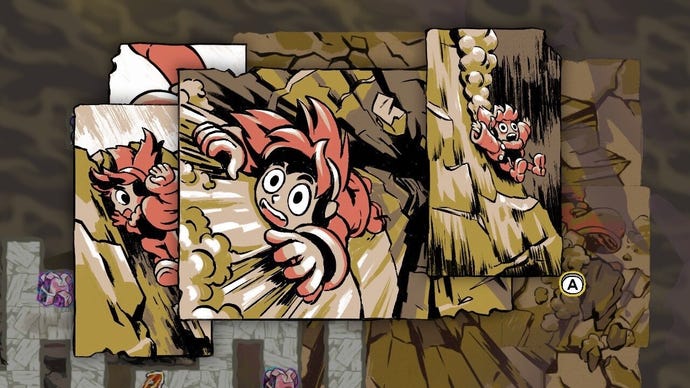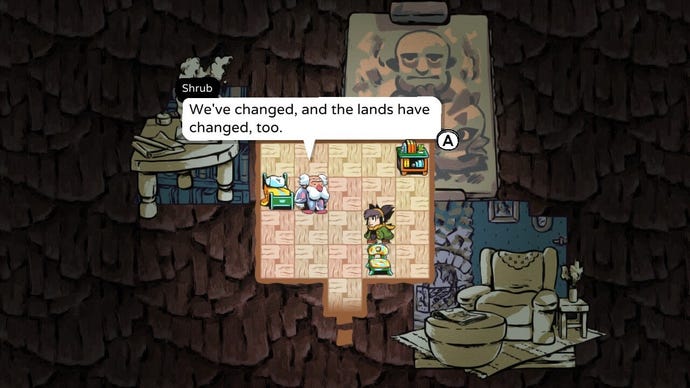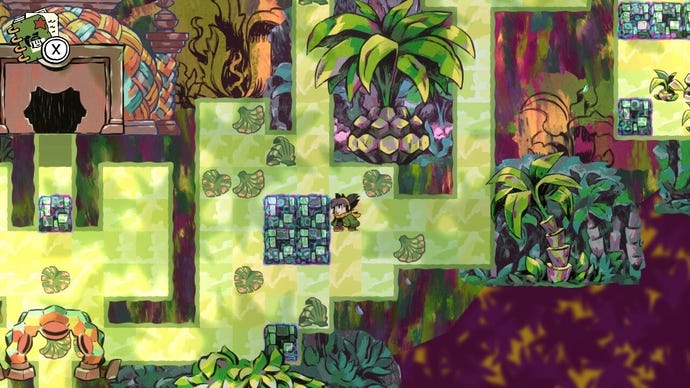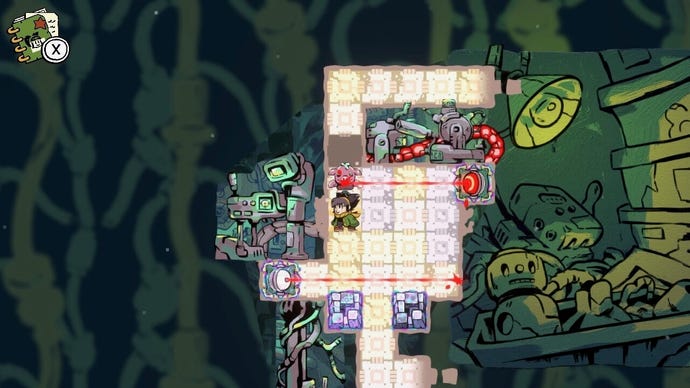Arranger is a puzzle game about moving, in both metaphorical and literal senses. Movement is the entire basis for the puzzles in Arranger, and is hard to explain without showing you (if you’re able to watch the trailer that will be helpful). The world of Arranger is divided into a grid, and you don’t move the main character, feisty misfit kid Jemma, across the squares. Rather, imagine that the row or column Jemma is on becomes a travelator, and you control the direction and speed of it. Jemma stands still and you move the ground, and anything on it left, right, up or down – like How To Say Goodbye but with more squares. It’s one of those things that makes sense when you’re doing it, trust me.
Jemma lives in a small town inside The Hold, a sort of barrier that protects the inhabitants from Static, a purple-rainbow oil-slick sort of a force that locks people and things in place. Jemma, though, being an adventurous person, wants to leave town and see what else is out there. This forms the first part of your adventure, as early puzzles teach you how to navigate Arranger’s moving grid. Bully blocking your path? Turns out the grid wraps, so you can pass through one end of it and appear on the other side. Need to move a box of rubbish somewhere? Figure out how to pull and push it along with Jemma, or move her around without moving it.



It’s ultimately a simple concept for a puzzle game, as most puzzles boil down to ‘get from one side of the screen to the other’, but simple doesn’t mean bad, and it’s amazing how much variety Furniture & Mattress are able to introduce over the game’s 8-ish hours. There are a bunch of differently themed areas in the game – a sort of beachy village, a tech dungeon, an orange, rocky desert covered in cactuses – and I advise you to pay attention to the illustrations that paper the background of scenes, and serve as comic-ish cutscenes when something happens. It’s a really effective way to add character and detail in a zoomed out, 2D game.
But of course, puzzles have variety too. Rocks affected by Static block your path, while other items have to be moved around them, Tetrised carefully into a configuration that leaves Jemma enough squares to pass by. Gummy, scream-faced Static monsters appear and gum up the grid, and must have swords pushed or pulled into them to clear the way. Early on a man asks you to shear his sheep in a sort of time trial, and hooboy are they not actually sheep. There are puzzles to navigate while linked to another character, and one where you have to sneak a girl out of her house while blocking her parents’ view with their own furniture. The slightly disappointing parts are a scant few boss fights, which all involve moving multiple things into position while the octopus/worm/blob monster patiently waits, until you manage to poke it in its big eye.
In general though, Arranger never really gets old. Despite all the puzzles having the same root concept, they get appreciably harder, and some of them will hit your mind in such a way that it’s like running into a brick wall. I struggled for quite a while with some late-game puzzles where Jemma must move chunks of machinery to remake the floorplan of the level, but I loved moving obstacles around laser traps in a creepy lab.

Not to fear, though, because there are optional settings that allow you to skip almost any puzzle in the game (not including optional puzzles like finding a necklace in a mine, which was, to be frank, a pisser that I never managed to solve). It’s a friendly touch that I appreciated, as a puzzle fan who is always trying to get other people to try games in a potentially unfriendly-feeling genre.
I have a feeling that the humour in the writing will gain Arranger some fans too. The weirdo sheep are one of many examples where a giggle caught me by surprise. An inventor explains she’s made a robot that can’t feel love, which Jemma says is very cool; the Robot itself waits a beat to make a sad face. There’s a running joke, in a section set in an underground commune with many ancient traditions, that really tickled me and therefore I won’t even approach spoiling. It’s well done, to the point that the ongoing tone contrasts with some clangers of the really-makes-you-think variety. One town has stopped talking because they use a fleet of mechanical birds to send short messages to each other instead. Take that, Elon. Another example of this is unfortunately the final moral of the entire game. It’s satisfyingly on theme, but heavy handed and predictable, especially when you stack it up next to things like the non-sheep.
I’m being a bit of a curmudgeon about that, though. In general Arranger is an imaginative, cheerful, funny game that doesn’t outstay its welcome. I think it’ll provide a great challenge for puzzle enthusiasts, but it’s kind enough to throw at someone who is only just getting into them. In specific, I still haven’t been able to solve the optional mine puzzles. But that just makes me want to try again.
This review is based on a review build of the game provided by the developer.











Add comment